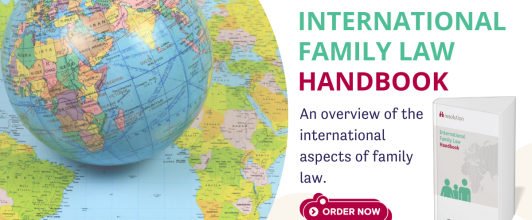
The Review
The Review is Resolution's bi-monthly magazine for members. Publishing six times a year with a mix of features, law and practice and news from the regions.
Broad range of information for professionals and practitioners in family law and justice.
Showing 401 - 420 of 518

The Review is Resolution's bi-monthly magazine for members. Publishing six times a year with a mix of features, law and practice and news from the regions.

Resonate is a new blog from Resolution, bringing together voices from across family law to share insight, experience and both personal and professional perspectives
As part of Resolution's Code of Practice members are asked to use the Good Practice Guides as part of their day to day work. These represent Resolution's core values and are designed to offer knowledge and guidance to our members.

Resolution Together is a way of working that allows lawyers to work with and advise couples jointly, including providing appropriate legal advice, through a divorce or separation.

Find resources on mediation, collaborative practice, arbitration and more.

This list of recommendations of family lawyers in other jurisdictions has been compiled by the members of Resolution's International Committee based on their working experience. The lawyers on this list are not Resolution members - unless indicated - and as such are not endorsed or recommended by Resolution.
The purpose of this document is to highlight the key Mediation claiming issues that continue to be identified by the LAA. By being aware of these issues a more focused approach can be adopted, so that Providers are more able to submit accurate claims. It should also be noted that these areas will be specifically scrutinised by the LAA during any future visits or audits.
A review of the Child Arrangements Programme PD 12B: Report to the President of the Family Division by the Private Law Working Group
This video was recorded in June 2019 and is presented by Robyn Bradey (expert social worker based in Sydney, Australia).
In this podcast, Tom Farrell and Mike Caffyn discuss what makes family law a distinctive and compelling area to work in for financial advisers, and how getting Resolution's specialist accreditation can help develop your career.
What follows is a selection of comments made to practitioners and potential responses. These are not 'scripts' but ideas as it is also important that you say things in a way that is authentic to your speech and therefore for anyone you are speaking to.
Resolution members are all committed to working in a conciliatory way and adhering to the Code of Practice. This means that you should ensure that even when you are faced with a complaint (and possibly a very angry person), that your commitment does not vary from your normal professional approach.
This is the landing page for all resources for our mediator members. Here you can download all of your mediation documents.
On 6 April 2016, radical changes are to be made to the state pension of which practitioners must be aware.
The current state pension scheme (“the current scheme”) applies to those already claiming their state pension and those who will reach state pension age prior to 6 April 2016.
The Pensions Act 2014 introduces a new state pension scheme (“the new scheme”) for those who will reach state pension age on or after 6 April 2016 (ie men born on or after 6 April 1951 and women born on or after 6 April 1953).
The widely publicised pension freedoms were introduced on 6 April 2015 and brought with them a number of unexpected, and almost certainly unintended, consequences for family lawyers and their clients. One of the most concerning consequences is the effect of the freedoms on existing Pension Attachment Orders. This briefing addresses that specific issue.
Since 25 November 2013, the Child Support Agency (CSA) will no longer accept new child support cases. All new applications are now dealt with under the new scheme, with new rules, by the Child Maintenance Service (CMS).
The aim of this guidance note is to make more efficient the process by which initial enquiries are made of experts and by which they are instructed. It is hoped that the precedents can become widely adopted as through familiarity these benefits will become enhanced. However it provides guidance on the most common questions and issues that arise, but with the warning to practitioners to focus on the specific needs of each case rather than a routine adoption of what can be no more than a model.
Marital agreements are becoming an everyday part of many family lawyers’ workload and it is in recognition of this increasing role that this guidance note on dealing with them has been revised. If these agreements are not a mainstay of your practice then it is important for you to consider instructing specialist counsel to provide an opinion on the content of the proposed agreement, review the advice you have given or draft the agreement itself.
There is a fundamental principle that full and frank financial disclosure is needed in order for any consensus to be capable of forming a binding agreement, arbitral award and/or court order, irrespective of the process used to get there. This principle has been established for many years, although tested from time to time in the courts – sometimes with unexpected results. The law continues to develop.
The Family Procedure Rules (FPR) 2010 came into force on 6 April 2011 and made a number of changes to the way in which familiar documents need to be presented.
This practice guide is not intended to set out all of the forms that are in place. The list of forms is extensive, and we recommend that you make yourself aware of them. The purpose of this guide is to highlight the key points in relation to the requirements when finalising and submitting documents in relation to family proceedings. All references are to the FPR 2010, unless otherwise stated.
It was heartening to see Sir Andrew McFarlane, the new President of the Family Division, and Sir James Munby, the former President, open their discussion at the PSU ‘Future of the Family Division’ event in October by talking about the importance of wellbeing for family law professionals.
Resolution members have increasingly found they must work with litigants in person (LiPs).
In this article we address some key questions you may have when working with litigants in person and provide some top tips for communicating with your client when a litigant in person is involved.
In this podcast, Nicola Wallace and Catherine Wood QC discuss advocacy in family law.
In this podcast, Denise Ingamells, Head of London SPIPs at RCJ Advice, and Marc Etherington from Resolution’s Parenting After Parting Committee, discuss how the Separated Parents Information Programme works.
In this audio recording of their workshop, Gillian Bishop and Felicity Shedden, explore how parenting co-ordination supports parents in high conflict to implement final child arrangements orders or parenting agreements.
The procedure for financial dispute resolution appointments (FDRs) is set out in Part 9.17 of the Family Procedure Rules 2010 (FPR) and Practice Direction 9A (PD 9A). They are meetings “held for the purposes of discussion and negotiation”, "to reduce the tension which inevitably arises in family disputes and facilitating settlement of those disputes" (para 6.1 PD 9A).